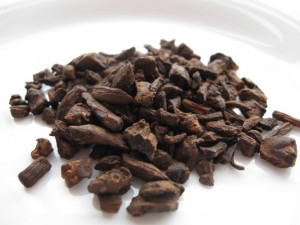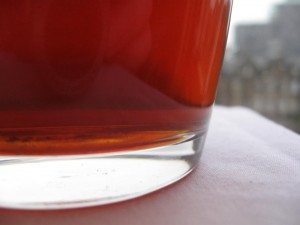Last updated: March 21, 2013
Note: this article is about dandelion root tea. Click to read the article on dandelion leaf tea.
Dandelion root tea, also called dandelion coffee or roasted dandelion tea, is a caffeine-free infusion made from the roasted roots of the common dandelion (Taraxacum officinale). It’s a popular coffee substitute because it has an earthy, roasted, bitter taste somewhat similar to regular coffee. It has a long history of being used when supplies of coffee have been short; it’s mentioned as a coffee substitute as far back as the American Civil War1!
Common dandelions grow all over the world. In the past few decades, many people have begun to drink “dandelion coffee” not as a coffee substitute but because they believe it’s particularly healthy. I’ll discuss the evidence for health benefits after I describe making and drinking the tea.
Appearance
Dandelion root tea is made from the thick roots of the dandelion plant. The roots are cleaned, cut into half-inch sections and then roasted, producing hard black pellets. Sometimes the pellets are ground up and sold as a coarse powder, like ground coffee.
The aroma of the roasted roots is wonderful; it’s much closer to cocoa than coffee and has a really rich, dark, full and spiced aroma that moves past dark chocolate into notes of woodiness and earthiness.
How to make dandelion root tea
Making dandelion coffee is very simple. Your roasted dandelion root can be whole or ground.
- In a large teapot or french press, add 1 or 1.5 heaped teaspoons of roast dandelion root per cup of water. If you’re using ground dandelion root, I suggest 1 level teaspoon per cup.
- Bring your water to the boil and pour it over the dandelion root.
- Cover and leave to infuse for 5-7 minutes. If you’re using ground dandelion root, infuse for 2-4 minutes.
- Strain out the dandelion root (press the plunger if you’re using a french press) and serve immediately.
Drinking dandelion root tea
Color: the tea is dark reddish-brown. It’s similar in color to a very strong black tea or a weak filter coffee. Held up to the light, it’s more ochre. The color is a little darker after 10 minutes infusing compared to 5.
Aroma: like the dry root, the brewed tea smells a little like cocoa or very dark chocolate with no sweetness. The aroma is less intense than with the dry root. There’s also a note of something green or raw.
Taste: after infusing for 3 minutes, the most obvious flavor is bitterness. However, it’s not entirely like the bitterness of coffee – it’s more similar to the bitterness of a very green vegetable. I once experimented with juicing kale and broccoli. That experiment was not a success (believe me!) but I’m reminded of the extreme, almost chemical bitterness of that juice, albeit to a much milder degree.
After 5 minutes infusing, the bitterness is stronger and perhaps a little fuller, but it’s still a one-note flavor with none of the complexity of coffee. Perhaps the problem is that, unlike coffee, dandelion root tea isn’t acidic at all. Even though the bitterness is now a strong flavor, as a whole the tea still tastes watery and lacks depth.
However, I am beginning to warm to dandelion root tea a little. I can, perhaps, see myself drinking this if coffee weren’t available. (Probably only during times of war, but still.)
After 10 minutes of infusing, the aroma is much the same but the tea seems a little fuller, a little toastier, a little closer to coffee. To be honest, I can’t tell if it’s because of the longer infusion time or just because I’m becoming more accustomed to this tea’s particular flavor.
I never take milk or sugar with coffee (and very rarely with tea), but in the spirit of inquiry I decide to see how dandelion tea tastes with these classic coffee additives.
Milk takes the edge off the bitterness (as one might expect) but makes the drink seem even more tepid and watery.
Sugar does a good job of rounding out some of the uneven notes of the tea: the bitterness is a little less bitter, the wateriness is a little less flat. While I find this interesting, I would hate to drink something regularly I would have to add sugar to.
Overall, while dandelion root tea clearly (clearly!) doesn’t taste as good or as interesting as regular coffee, I enjoyed it a great deal more by the end of the tasting session than at the beginning, and I suspect that’s because its flavor profile takes some getting used to. (In fairness, I’m sure regular coffee takes some getting used to as well.)
Dandelion root tea benefits
Most of the purported benefits of dandelion root are theoretical, based on experiments performed on laboratory animals or human cell cultures rather than in people. In other words, there are no medically-proven benefits to drinking dandelion root tea. However, there are some potentially promising areas of research, which will hopefully lead to clinical trials in the future.
Dandelion root and cancer
A number of in vitro studies have found that dandelion root extract appears to have to ability to cause cell death in some types of cancer cell while being non-toxic to healthy cells2345. Many of the conclusions to these studies are optimistic. For example:
The results from this study indicate that natural products, in particular Dandelion Root Extract, have great potential, as non-toxic and effective alternatives to conventional modes of chemotherapy available today.
However, no clinical trials of dandelion root have been performed in humans to investigate what effect dandelion root has in the human body. There is no firm evidence of any kind that dandelion root can prevent or treat cancer in people. Therefore, it’s extremely inadvisable to try to treat any form of cancer with dandelion root in the place of conventional treatment. It’s also very important to discuss taking dandelion root with a doctor because dandelion extracts can “interfere with regular chemotherapy”6.
Dandelion root tea weight loss
Dandelion is one of a number of supplements commonly marketed as contributing to weight loss. The purported mechanism is via decreasing water retention7.
A small pilot study found an extract of dandelion leaf appeared to have some effectiveness as a diuretic8. Some animal studies show a weak diuretic effect of dandelion root extract9, but it appears no human trials have been conducted.
Regardless, the use of diuretics as a weight loss agent is not recommended7.
Other research
Other preliminary animal and in vitro research has been conducted on dandelion root as anti-inflammatory10, anti-atherosclerotic11, hepatoprotective12 and immunostimulatory13. There is not yet any evidence to suggest these effects occur in humans.
Dandelion root tea side effects
The dandelion plant is “entirely edible” and nontoxic13. It’s been eaten as a food for hundreds of years. This suggests it is likely safe for most healthy people when taken at a regular dose (approximately 10 grams or 1/3 ounce of dried root per day13).
However, it’s possible dandelion root may interfere with or exacerbate the effects of certain drugs, particularly diuretics and antihypertensives14 and cancer treatment6.
There is also a case report of a dandelion product appearing to cause hypoglycemia in a diabetic woman15.
Consult with your doctor before taking dandelion root tea if you have a serious health condition, take medication or have any concerns.
Closing thoughts
Dandelion root tea is difficult to classify. While it clearly is a herbal tea, it’s much closer to coffee in appearance, aroma and taste. It has a flavor that takes some getting used to but is, on the whole, pleasant. Personally, I prefer the taste of a high quality Swiss-water-process decaff coffee.
As far as medical benefits go, there is a large quantity of very preliminary research I might tentatively describe as “promising”, but no firm evidence to rely on. What’s more, most of the research that has been done has been performed on extracts of raw or steamed dandelion root, not the roasted dandelion root that’s used to make dandelion tea. One of the potential (and largely theoretical) health concerns of coffee is the presence of a chemical called acrylamide which is created by the roasting process. While I have no data at all on the presence or absence of this chemical in dandelion root tea, I might speculate that people abandoning coffee due to fears of acrylamide might be more comfortable with a drink made from unroasted plant material. If I have the chance to taste unroasted dandelion tea in the future, I’ll update this article.
Perhaps it’s unfair to compare dandelion root tea to coffee: just because it happens to taste vaguely similar doesn’t mean I should expect it to be as pleasant or complex as a drink that’s been refined in cafes and kitchens for centuries. Compared to most other herbal teas, dandelion root tea has a bold, bitter, earthy flavor and an intriguing aroma of cocoa and spice. It’s definitely worth a try, even if it might take you a few cups to get used to it.
- Deserter Country: Civil War Opposition in the Pennsylvania Appalachians [↩]
- Selective induction of apoptosis and autophagy through treatment with dandelion root extract in human pancreatic cancer cells [↩]
- Efficient induction of extrinsic cell death by dandelion root extract in human chronic myelomonocytic leukemia (CMML) cells [↩]
- The efficacy of dandelion root extract in inducing apoptosis in drug-resistant human melanoma cells [↩]
- Selective induction of apoptosis through activation of caspase-8 in human leukemia cells (Jurkat) by dandelion root extract [↩]
- “Cancer-killing dandelion tea gets $157K research grant” at CBCNews Health [↩] [↩]
- “Common Dietary Supplements for Weight Loss” at American Family Physician [↩] [↩]
- The Diuretic Effect in Human Subjects of an Extract of Taraxacum officinale Folium over a Single Day [↩]
- Taraxacum–a review on its phytochemical and pharmacological profile [↩]
- Anti-inflammatory activity of Taraxacum officinale [↩]
- Hypolipidemic and Antioxidant Effects of Dandelion (Taraxacum officinale) Root and Leaf [↩]
- In vitro and in vivo hepatoprotective effects of the aqueous extract from Taraxacum officinale (dandelion) root against alcohol-induced oxidative stress [↩]
- Diverse biological activities of dandelion [↩] [↩] [↩]
- Safety of Herbal Supplements: A Guide for Cardiologists [↩]
- First report of hypoglycemia secondary to dandelion (Taraxacum officinale) ingestion [↩]


